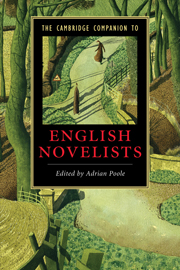Book contents
- Frontmatter
- Introduction
- 1 Daniel Defoe
- 2 Samuel Richardson
- 3 Henry Fielding
- 4 Laurence Sterne
- 5 Frances Burney
- 6 Jane Austen
- 7 Walter Scott
- 8 Charles Dickens
- 9 William Makepeace Thackeray
- 10 Charlotte Brontë
- 11 Emily Brontë
- 12 Elizabeth Gaskell
- 13 Anthony Trollope
- 14 George Eliot
- 15 Thomas Hardy
- 16 Robert Louis Stevenson
- 17 Henry James
- 18 Joseph Conrad
- 19 D. H. Lawrence
- 20 James Joyce
- 21 E. M. Forster
- 22 Virginia Woolf
- 23 Elizabeth Bowen
- 24 Henry Green
- 25 Evelyn Waugh
- 26 Graham Greene
- 27 William Golding
- Guide to further reading
- Index
2 - Samuel Richardson
Published online by Cambridge University Press: 28 March 2010
- Frontmatter
- Introduction
- 1 Daniel Defoe
- 2 Samuel Richardson
- 3 Henry Fielding
- 4 Laurence Sterne
- 5 Frances Burney
- 6 Jane Austen
- 7 Walter Scott
- 8 Charles Dickens
- 9 William Makepeace Thackeray
- 10 Charlotte Brontë
- 11 Emily Brontë
- 12 Elizabeth Gaskell
- 13 Anthony Trollope
- 14 George Eliot
- 15 Thomas Hardy
- 16 Robert Louis Stevenson
- 17 Henry James
- 18 Joseph Conrad
- 19 D. H. Lawrence
- 20 James Joyce
- 21 E. M. Forster
- 22 Virginia Woolf
- 23 Elizabeth Bowen
- 24 Henry Green
- 25 Evelyn Waugh
- 26 Graham Greene
- 27 William Golding
- Guide to further reading
- Index
Summary
In February 1751, Samuel Richardson (1689-1761) contributed an essay to Samuel Johnson's periodical The Rambler. Johnson, in introducing Richardson's piece, described his friend as one 'who has enlarged the knowledge of human nature, and taught the passions to move at the command of virtue'. As a lexicographer, Johnson exempted Richardson from his general policy of not citing contemporaries and quoted him in his Dictionary on over one hundred occasions, far more than any other living author. By 1761, the year of his death, Richardson occupied a commanding position among European writers and was celebrated in a famous eulogy by Denis Diderot. Both Johnson and Diderot were struck by Richardson's profound insights into human psychology, and Diderot regarded him as a worthy successor to Homer. Richardson had achieved his reputation as the originator of a new kind of novel-writing on the strength of three works published over the two previous decades: Pamela (1740-1), Clarissa (1747-8), and Sir Charles Grandison (1753-4). Pamela created a sensation on its first publication and was the best-selling novel of its time. Richardson's masterpiece, Clarissa, is among the greatest (and longest) of all English novels; its protagonists, Clarissa and Lovelace, are archetypal figures. Frances Burney, writing to her son, declared that Clarissa 'has the deepest tragic powers that the pen can address to the heart'.
- Type
- Chapter
- Information
- The Cambridge Companion to English Novelists , pp. 31 - 47Publisher: Cambridge University PressPrint publication year: 2009



